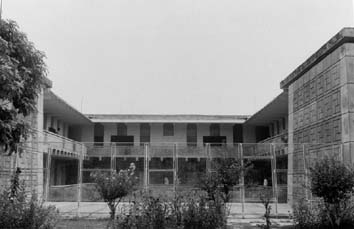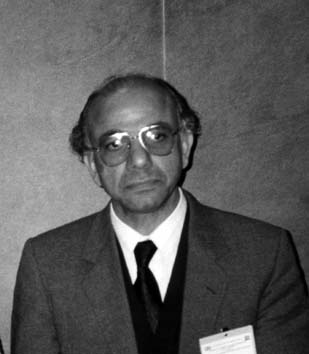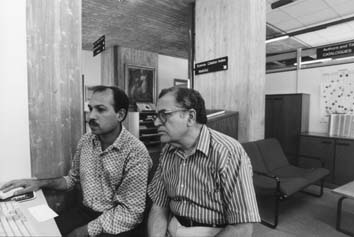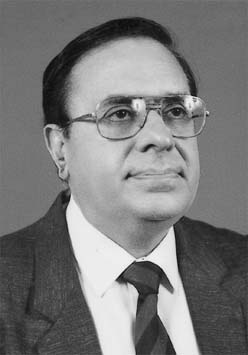Personal tools
News from ICTP 94 - Features - Pakistan

Throughout his career, Abdus Salam called for the development of strong scientific communities in Pakistan. The progress he sought may finally be taking place after years of neglect.
Physics in Pakistan
Abdus Salam's place in the annals of the history of physics--and, more generally, the history of science--is secure. As the first scientist from the Islamic world to win the Nobel Prize and as the founder of the International Centre for Theoretical Physics (ICTP), there's little doubt that the scientific world will still be paying homage to Salam for decades to come.
Yet, one of Salam's lifelong goals--perhaps the one closest to
his heart--ultimately proved to be the most elusive. Throughout
his long and distinguished career, Salam devoted a great deal
of time and energy to the promotion of science in Pakistan, the
country of his birth. But, unlike his work in Trieste, Italy,
on behalf of the developing world, his efforts in Pakistan fell
far short of the long-term impact he had envisioned.
Despite serving as chief scientific advisor to the president of
Pakistan for 13 years, despite launching in 1976 the International
Nathiagali Summer College on Physics and Contemporary Needs (which
is still going strong), despite writing extensively and passionately
on the subject, and despite continually cajoling Pakistani officials
to invest more funds in science, near the end of his life Salam
lamented: "Countries like Turkey, Egypt and my own country
have no science communities geared to development because we do
not want such communities. We suffer from a lack of ambition towards
acquiring science, a feeling of inferiority towards it, bordering
sometimes even on hostility."
Today, some 35 years after the creation of ICTP that now bears
his name and some four years after his death, Salam's call for
the creation of a vibrant science community in Pakistan--spearheaded
by research excellence in physics--may finally be emerging from
the shadows of neglect.

National Centre for Physics
But that doesn't mean serious problems don't persist. As Pakistani-born ICTP Senior Associate Ghulam Murtaza notes, "there are just 20 active physicists in all of Pakistan, a country of 130 million people. And, historically, there have been only a handful of institutions where 'serious' research in physics has taken place: the Department of Physics at Quaid-i-Azam University, the Pakistani Atomic Energy Commission's Institute of Science and Technology, and, more recently, the National Centre for Physics, also at Quaid-i-Azam University, and the Department of Physics at Government College. In fact, the majority of physics research is conducted by the nation's atomic energy commission. That's often made it difficult for the concerns of professors in university departments of physics to be heard."

Ghulam Murtaza
As if small numbers of researchers and the absence of reputable
institutions were not daunting enough, physics in Pakistan also
faces an 'age' problem. As former ICTP Associate Riazuddin, who
also hails from Pakistan, observes: "Although Salam may not
have succeeded in establishing an internationally recognised physics
community in Pakistan, he helped convince the Pakistani government
to make a series of modest investments in scientific research.
As a result, there was a flurry of activity in physics during
the 1960s and 1970s that prompted the training of a small group
of physicists who were born in Pakistan."

Riazuddin (left)
He then goes on to add that "these researchers, and I include myself among them, have either retired or are approaching retirement. The problem is that there are fewer and fewer young Pakistani physicists now being trained to replace them." Indeed, several observers fear that if current trends are not reversed, the number of researchers working in Pakistan with active research agendas could dip below 10 within the next decade.
Despite these problems, there are some promising signs of a brighter
future. Atta-ur-Rahman, a Cambridge-trained chemist, who has often
praised ICTP (most recently at the World Conference on Science
in Budapest in 1999, where he received the UNESCO Science Prize),
was appointed Minister of Science and Technology this past spring.
During his brief tenure, Atta-ur-Rahman has convinced his government
that generous funding for science and technology could produce
valuable long-term dividends for economic development. As a result,
the government's proposed budget for science and technology has
been raised from US$2.2 million in 2000 to US$300 million in 2001--an
astonishing increase that brings Pakistan's expenditures for science
and technology to 0.5% of its gross domestic product (GDP).

Atta-ur-Rahman
To date, the development of information technologies and strategies
to promote such engineering-oriented sciences as biotechnology
and materials science--both of which promise near-term commercial
applications--have been the target points for next year's science
and technology budget. But as Murtaza notes, "university-based
researchers in fundamental science, including physicists, remain
optimistic that the ministry will be responsive to their needs."
"Atta-ur-Rahman," he says, "is an accomplished
research scientist who understands the importance of basic science.
We are confident that his overall policy will include strong support
for basic science as an integral part of the government's overall
funding strategy."
Meanwhile, two recent university events raise hope that the decline
in fortunes for physics in Pakistan will soon be turned around.
In January 1999, Riazuddin was named the founding director of
the National Centre for Physics, headquartered at Quaid-i-Azam
University in Islamabad. The centre, which traces its 25-year
incubation period back to Pakistan's International Nathiagali
Summer College on Physics and Contemporary Needs, has been modelled
after ICTP. In fact, Riazuddin hopes that his centre "can
evolve into a mini-, Pakistani-based, ICTP."
During its 18 months of existence, Riazuddin notes, "the
National Centre for Physics has hosted a series of workshops,
schools, courses and conferences devoted, for example, to the
study of high energy physics, semiconductor physics, computational
condensed matter physics, plasma physics and astrophysics."
All activities are designed to assist physicists living and working
in Pakistan. In addition, the centre has signed a collaborative
agreement with CERN (the European Organization for Nuclear Research)
in Geneva, Switzerland, to assemble and test the resistant plate
chambers of the compact muon silicon detectors associated with
the Large Hadron Collider (LHC), which will be the world's leading
particle accelerator. CERN hopes to have the LHC in operation
by 2005.
To build on its recent success, Riazuddin has submitted a funding
proposal to the government that would allow the centre both to
expand its research and training activities and to build a 50-room
guesthouse, library and computer facilities so that "visiting
scientists can pursue their studies free from the daily distractions
that often take place in their home institutions." In the
words of Riazuddin, the proposal, which calls for an additional
US$2 million over a 3-year period, would transform the institution
from a 'nucleating' to a 'permanent' centre.
Another step in efforts to revive physics in Pakistan took place
this March, when Murtaza, who was a student of Salam at Imperial
College in London, was named the first Salam Professor of Physics
at Government College in Lahore, where Salam taught in the early
1950s. Murtaza hopes to use the chair to build co-operative centres
of excellence in such fields as plasma physics and condensed matter
physics. "The focus," Murtaza observes, "will be
on young scientists. In fact, we hope to launch master's and doctorate
programmes that will serve as important training grounds for the
next generation of Pakistani physicists."
Neither the government's recent commitment to increase its funding
for science and technology, nor the creation of a Salam chair
in physics or a new physics research centre guarantees a resurgence
in science--and, more specifically, physics--in Pakistan. But
it does suggest that the study of physics, after a long period
of dormancy, may soon experience a turn around.
Such a development would certainly have pleased Salam. As Riazuddin
notes, "If he were alive today, I am sure he would be delighted
to see that aspects of his vision are at last being transformed
into reality." Riazuddin might well have added that Salam
would be the first to say that much more needs to be done and
that there is no better time to start than right now.
For additional information about the National Centre for Physics
at Quaid-i-Azam University in Islamabad, contact ncp@comstats.net.pk
or phone 92 51 273545. For additional information about activities
associated with the Salam Chair of Physics at Government College
in Lahore, contact schair@lhr.comsats.net.pk
or phone 92 42 9212245.